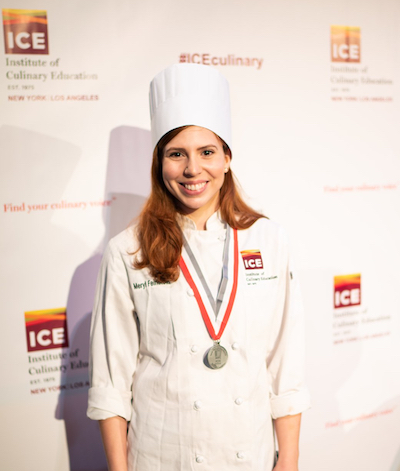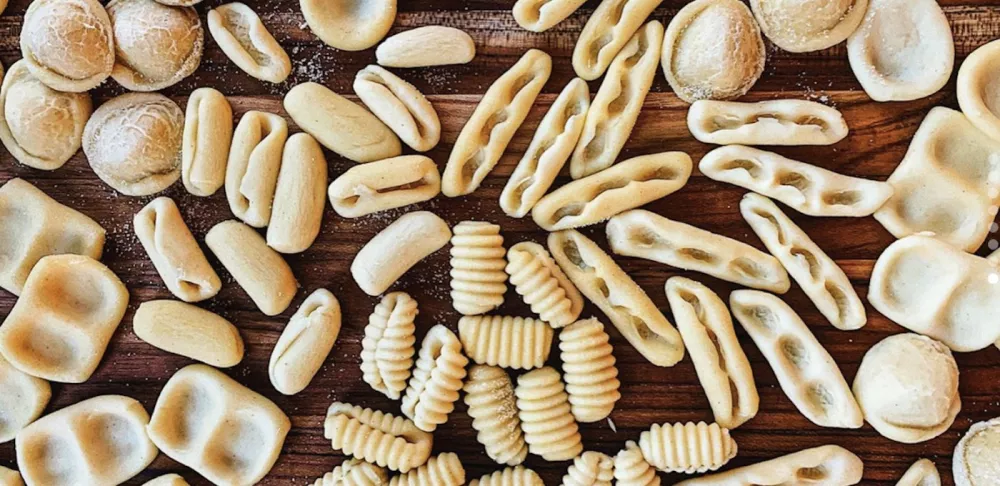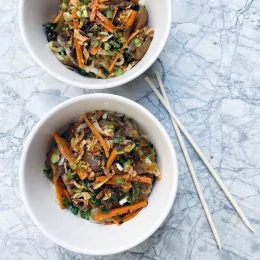If you’re into pasta, it’s likely you’ve seen Meryl Feinstein’s (Culinary, '18) Instagram account, Pasta Social Club. Beyond a gorgeous array of cavatelli with meatless ragu, crispy-bottomed roasted garlic mashed potato cappelletti and pink peppercorn-speckled golden beet casunziei, the photos are a landing page to promote Feinstein’s in-person events, where she teaches classes on making regional pasta styles, shapes and sauces, and gathers people to eat pasta.
With the pandemic shelter-in-place orders in full swing, Meryl, who is based in Austin, Texas, and travels to New York frequently, is hosting Pasta Social Club events online, connecting with eager pasta students (and eaters) all over the world, who want to master pici, orecchiette and more handmade pastas with basic pantry ingredients.
We spoke with Meryl to learn more about Pasta Social Club, where her passion for pasta came from (a romantic trip to Italy, of course) and how she quickly changed careers from public relations to culinary arts.
Why did you want to enroll in culinary school?
Before I went to ICE, I worked in the art world in Manhattan. I did public relations for art museums all over the world. After five years, I felt like I hit a wall in that career. I didn't really see a future in it beyond what I’d already done, and I knew I wanted to be in the food industry.
What appealed to you about working in food?
Food had always been a passion of mine but never a viable career path in my family and my own thinking. I thought about doing food PR and going into the industry in a way that made sense, financially, but my husband and I were talking about it, and he really encouraged me to go to school. I knew I wanted to be in the kitchen, not at a desk. I was interested in food media and thought with a culinary arts diploma, I’d be able to do whatever I wanted. I already had a bachelor's degree and master's degree but had never worked in restaurants. I’ve been watching Food Network since I was eight. My family went to a lot of amazing restaurants and I had a very strong taste for everything — there was nothing I didn’t like. I did studio art on the side and pursued that path instead of cooking.
Why did you choose ICE?
My husband knew people who went to ICE. I wanted to earn a diploma as quickly as possible, and when I visited the campus, they really catered to people of all ages and people like me who had just jumped in. The facility is also really beautiful.
 How was starting culinary school and starting your third field of study?
How was starting culinary school and starting your third field of study?
The first day was terrifying. I had never been in an industrial kitchen before. It was scary. Everything was hotter and sharper than I'd ever experienced. Before that, my life was a comfort zone experience: I made choices based on what I could do well. This was the first time I knew that I couldn't do well. I didn't know anybody and my class was on the younger side. A lot of people in my class had restaurant experience. After a couple of weeks, learning how to sharpen a knife and use the burners, I adjusted pretty quickly. I had some great teachers, so that was helpful.
How did studying culinary arts prepare you for a culinary career?
At first, I was committed to doing food media. I loved to write and interned at a test kitchen in the mornings before class. It wasn’t the experience I thought I was looking for. I’m not one to weigh ingredients and be super particular about recipes. I realized it might not be a good fit. By the time externship rolled around, I realized the time is now to work in a restaurant. This is something that’s going to make me feel really scared and really uncomfortable, and if I don’t do it, I’ll always regret it.
I worked the pastry line at Lilia in Williamsburg. I was scared every single day because I hold myself to a very high standard. I had two days of training and then I was by myself. Every restaurant works differently, the speeds and tasks you do on the line are so different from school. It’s great to have that base of knowledge, but in a restaurant, it’s a whole new set of skills.
How did you go from pastry to pasta?
After Lilia, I worked in pasta production at [sister restaurant] Misi for about six months, but it was before that … When I left the corporate world, my husband and I went on a honeymoon to Italy. We went to Modena, where an Italian nonna taught us pasta making. It was a magical experience. My love of food and art came together. At ICE, I knew I wanted to focus on pasta. I don’t eat meat or shellfish so I wanted to have expertise, zone in on a niche and get really good at one thing. Otherwise, I felt really unfocused as a cook. At ICE, we do pasta for two days, so I went to Lilia because [chef-owner and ICE alum] Missy Robbins (Culinary, '95) is the queen of pasta in New York. On days off from Lilia, I refined my pasta skills, learned new shapes and did research.
How did Pasta Social Club start?
While I was working at Lilia, I also knew I wanted to do some type of supper club experience, but my days off were Mondays and Tuesdays, which no one else has off. So I started an Instagram handle, @PastaSocialClub, and put the idea into the world, while I didn't have time or resources to start a business. With social media, I had nothing to lose. I was already doing so many things that freaked me out, so what was another thing to add to the pile? I got more into taking the photos and it gained some traction. Pasta is something that everyone loves!
Eventually, I had time to do some events in New York and then moved to Austin. My inspiration for events came from Shabbat. Growing up in an observant Jewish household, Shabbat was such a highlight of my childhood, a designated time to be with people you love and enjoy good food and still be super casual. I wanted to recreate that experience but not have it be religious. It’s available to everyone.
Explore a career change or passion project like Meryl with ICE's career programs.




